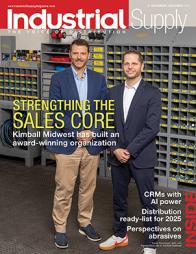Understanding lithium greases for industrial maintenance
By Doug Rice
When it comes to the maintenance of your fleet or machinery, selecting the right type of grease is essential for ensuring optimal performance and longevity.
 |
| Mystik Lubricants Product Specialist Tobia Isbell shows the various types of thickeners used in grease during a discussion of colors in grease. |
Simple lithium and lithium complex greases are among the most widely used, representing 57.33% of global total grease sales and 58.28% of the total production in North America, according to the National Lubricating Grease Institute.
Understanding the unique properties and specific applications of lithium greases will help you select the best grease for your fleet or machinery.
The History of Lithium Greases
The evolution of lithium-based greases began in March 1942 when American chemical engineer Clarence E. Earle was awarded a patent for “Lubricant Containing Lithium Salts.” This innovation introduced the first simple lithium soaps to the grease industry, offering improved water resistance, better high temperature performance and excellent mechanical properties, including better pumpability and resistance to shearing, compared to the traditional alkali metal counterparts.
In 1947, Lester W. McClennan patented the first lithium complex grease. By the 1980s, lithium complex greases started to replace simple lithium greases as the industry’s preferred choice.
Key Characteristics and Best Practices of Lithium Greases
1. Dropping Point
The dropping point of grease is the temperature at which the grease becomes liquid. It’s crucial to understand that dropping point tests the maximum temperature that a grease will hold its form, not the maximum temperature at which it can operate. Lithium complex greases have higher dropping points compared to simple lithium greases, meaning that they can withstand higher temperatures before breaking down.
Best Practice: For applications that involve elevated temperatures, such as high-speed machinery or engines, choose lithium complex grease, such as Mystik JT-6 High Temp #2 Grease, to ensure reliable performance in extreme operating temperatures and protection in various heavy-duty applications.
2. Shear Stability
Shear stability, or mechanical stability, is a grease’s ability to maintain its consistency under mechanical shear forces or stress. Both simple lithium and lithium complex greases are resistant to breakdowns typically caused by shear force, making them suitable for use in a wide range of applications.
Best Practice: Consider either type of grease for applications with significant mechanical stress. For applications involving high loads or speeds, lithium complex grease may offer enhanced stability and longer-lasting performance.
3. Water Resistance
Both simple lithium and complex lithium greases share good water resistance due to the low solubility of their thickeners. This means that both greases are resistant to absorbing water and being washed away or deteriorating in moist conditions.
Best Practice: In environments where exposure to water or moisture is a concern, either simple lithium or complex lithium will provide great protection. For conditions where enhanced water resistance is needed, lithium complex grease may offer better performance due to formulation.
4. Oil Separation Resistance
Oil separation resistance indicates how well the grease maintains its lubrication ability and storage stability. The grease should release enough oil during application in different contact zones, such as bearings and gears, while only releasing a limited amount of oil while in storage to ensure consistent performance.
Best Practice: Select a grease that provides a good balance between lubrication and oil separation. Additionally, proper lubricant storage and handling is key in optimal industrial maintenance. Proper lubrication is not only about the right lubrication applied at the right time and place, but it is also about keeping lubricants clean, cool and properly identified.
5. Cost
Simple lithium greases are usually more cost-effective due to simpler formulation and manufacturing processes. Lithium complex greases tend to have a higher cost due to the advanced formulation and more enhanced performance characteristics.
Best Practice: Opt for simple lithium grease if you are in the market for a grease for general-purpose applications with moderate temperatures. However, for higher temperatures, greater load-carrying capacity, or better eater resistance, lithium complex grease may be the better choice.
Lithium Grease for Optimal Industrial Performance and Longevity
Last, establishing strong relationships with your vendors and suppliers who specialize in parts and services for different lubricants and types of vehicles and equipment can be beneficial in your lubricant selection journey. A strong vendor-supplier relationship can ensure timely access to maintenance expertise and technical support specific to each equipment type. Contact your supplier about choosing the right combination of heavy-duty greases that will work together for your needs, such as CITGO’s premium line of Mystik? Heavy Duty Grease, for your optimized operation.
Overall, having a good understanding of lithium greases, along with the specific requirements of your industrial application - including temperature conditions, mechanical stress, water exposure – and lubrication needs of your vehicle or machinery will ultimately guide you in selecting the right lithium grease. Simple lithium greases are more cost-effective and reliable for specific applications, while lithium complex greases offer enhanced high-temperature stability and enhance water resistance.
Doug Rice is senior product specialist in grease technology with CITGO Petroleum. He is responsible for formulation of and technical support for branded and private label greases. He has 31 years of experience in lubricants including roles as associate technical engineer, laboratory supervisor, product specialist – fluids, product specialist – Grease, senioer technical service representative, senior account manager, and senior product specialist – grease. Rice is certified as a NLGI Certified Lubricating Grease Specialist (CLGS). He also holds the Certified Lubrication Specialist (CLS) and Oil Monitoring Analyst I (OMA-1) certifications from the Society of Tribologists and Lubrication Engineers (STLE).











